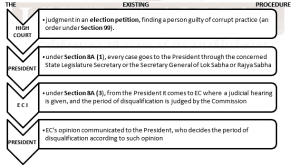APPROACH AND STRUCTURE
- Introduce with RPA and corrupt practices under it.
- Explain the procedure for disqualification of persons found guilty of corrupt practices and its complexities
- Discuss the need for simplification
- Conclude with suggestions
INTRODUCTION: The RPA, 1951, regulates the conduct of elections to ensure free, fair and an impartial electoral process. Section 123 defines “Corrupt practices” and Section 8A outlines the procedure for disqualification. But the procedure is very complex and time consuming.
Corrupt practices
- A wrong committed under corrupt practice can be brought before the courts only at the end of elections through an election petition filed under Article 329.
- These practice include bribery, promotion offeelings of enmity or hatred between different classes of the citizens of India on grounds of religion, race, caste, community, or language, by a candidate.
- Conviction for a corrupt practice entails only civil disabilities, like disqualification from votingand contesting elections for a maximum period of 6 years.

COMPLEXITIES AND NEED FOR SIMPLIFICATION
- Prolonged Process: The process can be initiated only through election petition which involves judicial delays. According to the report “Ethics in Governance” of the Second ARC, such petitions remain pending for years and even the full term of the house expires thus rendering the election petition infructuous.
- Subsequently, due to political reasons, there is inordinate delay in the submission to the president from the Secretaries of the Houses concerned. In one case, such reference was made after nearly five years, and in another, after more than two years.
- The provision for petition to the President for the removal of disqualification before the expiry of the disqualification period adds another layer of complexity.
- Nature of Corrupt Practices: The corrupt practices under the RPA cover a broad spectrum, from extremely objectionable to small technical infringement. This leaves scope for unwarranted complexities and arbitrariness.
- Decisions on such matters should be made promptly, as the period of disqualification cannot exceed six years from the date of order of the High Court/Supreme Court.
SIMPLIFICATION
- EC has recommended that there is need of revising list of corrupt practices in RPA e.g. inclusion of Paid news.
- The NCRWC recommended that special election benches designated for election petitions only should be formed in the High Court and the Second ARC recommended creation of Special Election Tribunals.
- In 2004, the ECI recommended that the Secretary to the ECI should be made the authority under Section 8A to submit cases of disqualification to the President.
- The procedure could also be simplified considerably by specifying a time limit in section.
CONCLUSION: The existing system, which has flexibility in the quantum of punishment based on the nature and gravity of the corrupt practice committed, should continue. The need is to simplify the procedure and resolve the questions of disqualification in a fair, impartial and timely manner.
Spread the Word
